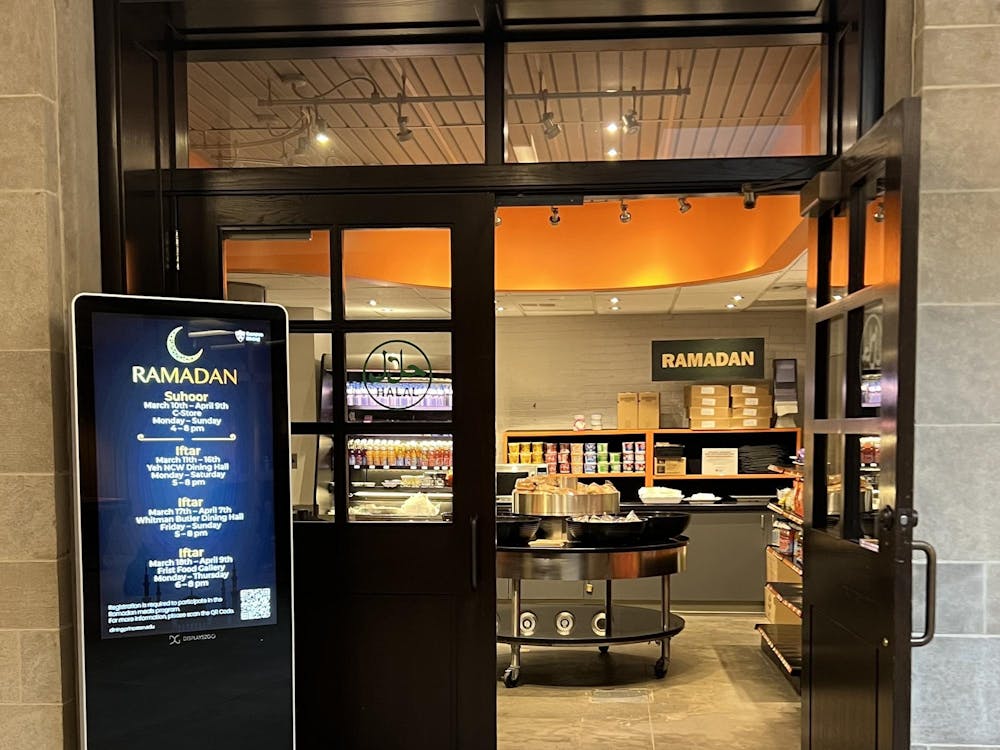On Monday, nearly 60 of the Princeton's Muslim students broke their fast together at the first community iftar (sunset meal) since they returned to campus following spring break. The meal, held in McCosh 28 and hosted by the Office of Religious Life (ORL), the Muslim Student Association (MSA), and the Projects Board, represented the first of many efforts to foster community and increase accessibility to halal meals and community spaces during Ramadan this year.
“Now that we’re all back, [we’re] hearing from our students how excited they are to be with the campus community and experience Ramadan together,” Imam Khalil Abdullah, the assistant dean for Muslim life, told The Daily Princetonian.
Abdullah said that the Muslim community on campus has greatly increased over the past few years to an estimated 400 members. He emphasized the collaborations between the MSA, the ORL’s Muslim Life Program (MLP), and Campus Dining to ensure accessibility to halal food for suhoor and iftar meals and to create community spaces for meals and prayer.
Increased offerings for Ramadan meals
In previous years, Muslim students expressed concerns with the lack of variety in year-round halal food options. Leena Memon ’25, the MSA co-president, told the Daily Princetonian that the MSA met with Campus Dining this past fall to discuss Ramadan meal offerings.
Any Muslim student, regardless of whether they’re enrolled in a meal plan for the rest of the year, can sign up for a no-additional-cost Ramadan meal plan. This plan allows students to use their meal swipes to pick up meals to break their fast in the evening (iftar) and the next morning (suhoor).
“Through student feedback, we diversified where students can pick up meals during this time,” Lauren Belinsky, the assistant director of marketing and communications for Campus Dining, wrote to the ‘Prince.’
Campus Dining has provided students with reusable meal bags to pick up breakfast foods for suhoor meals from 4:00 p.m. to 8:00 p.m. Monday through Sunday at the C-Store in Frist Campus Center. Last year, suhoor meal kits were only available Monday through Friday during a two-hour time frame.
Memon mentioned that Campus Dining has increased the available suhoor options, which now include pre-packed, microwaveable meals in addition to traditional breakfast foods. Additionally, Muslim students can pick up iftar meals from 6:00 p.m. to 8:00 p.m. at Frist Food Gallery from Monday to Thursday and from 5:00 p.m. to 8:00 p.m. at Whitman/Butler Dining Hall from Friday to Sunday.
Culinary Hospitality Manager at Whitman/Butler Dining Hall Dante Ingato told the ‘Prince’ that Whitman/Butler is ensuring that they incorporate only halal meats and remove alcohol-based ingredients such as vinegar from weekend dinners. Additionally, Campus Dining co-sponsors community iftars with the MLP on Tuesday and Thursday.
“Dining has been really supportive, working with us to kind of build up the program,” Arika Hassan ’26 told the ‘Prince’ at a community iftar on Tuesday, March 19.
Hassan is a contributing Humor writer for the ‘Prince.’

Memon also noted that some eating clubs may have their own policies for Ramadan accommodations in addition to the plan provided by the University.
Beyond Dining
Muslim community members emphasized that amid the month of fasting, Ramadan is above all a time of community and togetherness.
“The goal is for the Muslim community to be like a second family to all of its members, and I hope that students feel that way,” Memon told the ‘Prince.’
The prayer room at Murray-Dodge Hall has served as the hub of Muslim life on campus, but given high demand, MSA has found additional prayer spaces for students during Ramadan, including the Frist Campus Center and Whitman Common Room.
Looking toward additional ways to support Muslim students during Ramadan, MSA has noted a need for academic flexibility as students celebrate Eid al-Fitr, the end of Ramadan, on Tuesday, April 9 and Wednesday, April 10.
“We’re really hoping that students are able to … get alternative accommodations for academic commitments,” Memon said. “It’s really hard to feel fully free of your academic obligations even just for eight to 10 hours [of] being with the community.”
Abdullah noted that professors and community members have already responded positively to students’ requests. Regarding the wider campus community, he said that Muslim students are celebrating Ramadan “within the context of religious pluralism,” given the shared spaces in Murray-Dodge, and “there are opportunities there for us to share with our friends and our families.”
MSA invited Koach, the Center for Jewish Life’s Conservative minyan, to their iftar meal on Thursday. Later this month, during the Fast-a-Thon on Friday, March 29, MSA will invite the campus community to join them in fasting. A Multicultural Potluck Iftar is planned for April 5.
“We’re praying together more, we’re eating together more, we’re studying together more during this month,” Abdullah said. “It’s all the discipline and the religious, spiritual stuff, but I find that at the core, [Ramadan] is about fellowship, community, and being with each other.”
Elisabeth Stewart is an assistant News editor for the ‘Prince.’
Please send corrections to corrections[at]dailyprincetonian.com.
Correction: This article has been updated to clarify how students can use their swipes as part of the Ramadan meal plan.








